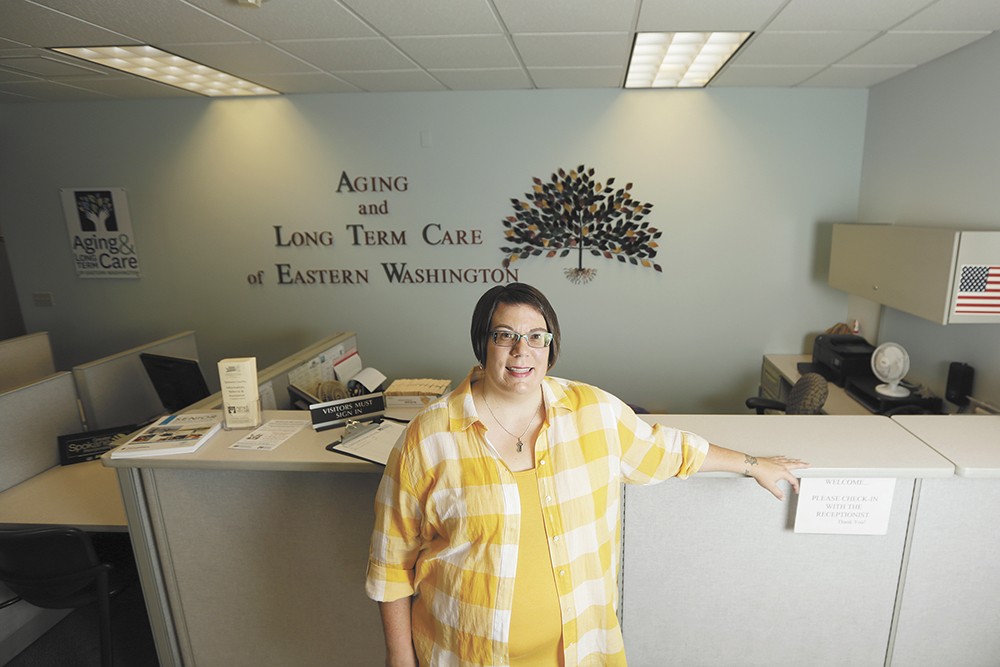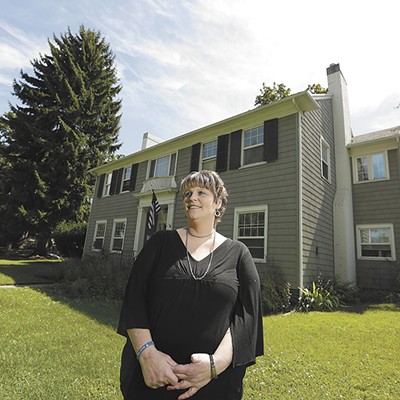
Teri Koski has been there. Now she's there for others. She's there for those struggling with mental illness and their families. She's there for the elderly with dementia and young people with traumatic brain injuries and refugees with amputated limbs.
She's there in her role of case manager at Aging and Long Term Care of Eastern Washington, which provides services to adults with disabilities. She's there in her role as president of the Spokane chapter of the National Alliance on Mental Illness, a nonprofit that provides support for those with mental illness and their families and friends, while connecting them to other local resources.
And she knows that her story, with all its pain and trauma and darkness and hope, can help her relate.
"When I was diagnosed in my early 20s, I thought I was the only person in the world who had mental illness. That's basically why NAMI exists," Koski says. "We're a whole agency of 'We f—-ing get it.'"
She gets the loneliness and stigma. She gets how dark moments can sap your motivation, making it feel like nothing you do matters. She gets how trauma can linger your entire life.
"Mental illness runs on both sides of my family, way back. Way, way, way back," Koski says. "My father is diagnosed with Asperger's. My mother grew up in a house with alcoholism present... My dad's mom has schizophrenia."
She says her parents did the best they could, but could be verbally and emotionally abusive. She says she was molested by a babysitter. During her childhood she heard the lie, told again and again, that she was worthless.
As awful as all this was — and still is — it gave her a glimpse into what trauma can do to a person. Many of the clients she meets with at Aging and Long Term Care are refugees who've experienced the horrors of war, and are left with post-traumatic stress disorder. She helped one young Afghan refugee, who'd been shot and paralyzed, find housing for him and his brother. She says another, an 87-year-old man, was blinded in his left eye after his Muslim-hating neighbor shot him with a BB gun.
"I've heard awful, awful stories," Koski says. "I had one client, her son's head was shot off in front of her. How do you even deal with that?"
Her own post-traumatic stress disorder helps her empathize. She won't tell everything to the people she helps — she has professional boundaries — but shares enough that they understand that she understands.
Ron Anderson, vice president of NAMI Spokane, says that Koski joined the organization aiming to lead.
"She saw potential that wasn't being fulfilled. She wanted to try to reach more people that need our services," Anderson says. "It was a hard goal to undertake, as she's bucking a lot of stigma, and using her own experiences and encouraging people to get help."
He says she gives speeches to classes and church groups. She talks to the police about how to respond to those who are having mental health crises.
Koski says she's tried to grow NAMI, aiming in particular at those with mild mental illness — where resources are often scarce — and mental-illness prevention. Today, she says, NAMI Spokane provides direct services to about 200 people per year.
Sometimes people contact her through a message on NAMI Spokane's Facebook page. "I had one lady who was saying, 'I'm thinking of leaving my husband. He has severe mental illness. I don't know what to do,'" Koski says.
Koski messaged back, giving her a list of resources she could use.
"She came up to me, and she says, 'I messaged you guys. You basically saved my life,'" Koski says. "'You have no idea where I was at. I was at my wits' end.'"
Koski knows how hard it can be to ask for help, and she gets how simply trying to find the correct diagnosis can be exhausting. In an Inlander profile two years ago, she described being diagnosed as "bipolar, followed by borderline personality disorder, obsessive-compulsive disorder and post-traumatic stress disorder."
The past winter brought yet another diagnosis — she was told she had an eating disorder relating to her PTSD, and may not even have bipolar disorder.
"Once you've formed your identity as part of 'I'm this person, and I'm the president of this organization, and I'm telling all these people, 'You can do it too, and blah blah blah?'" Koski says. "So now what? Have I been lying to all these people?"
But this time, she had the tools to fight the darkness. She relied on her friends and her support system, and managed to grit her way through it.
"A very good counselor told me once, 'It doesn't matter what you call it, it matters how you deal with it,'" Koski says.
She comes back to a Finnish word — sisu — meaning gritty perseverance. The turtle tattooed on her wrist symbolizes the importance of that kind of dogged tenacity. She tries to share that with the people she helps.
"You are not alone. And it gets better. Seriously," Koski says. "The hardest thing I've ever had to do is to get help and get with it and stay stable. ... It's the proverbial two steps forward and one step back."
But stick with that long enough, she knows, and you get where you want to go. ♦
Age: 40
Positions: Case Manager at Aging and Long Term Care of Eastern Washington; President of NAMI Spokane.
I give back because... That's what I was put here to do. I believe I was put on this earth to help other people. That's why I was here, that is my life's purpose.
I look up to... A lot of people. Friends, family, co-workers. Anyone who has struggled and come through the other side. My clients, my board directors. They're phenomenal people.
I wish that... Mental health stigma didn't exist. And that everybody would feel comfortable in accessing services, and that there were enough services for everybody to access them.
























